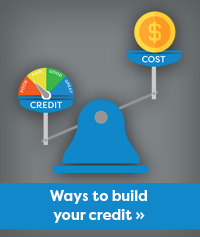The Basics About Credit Scores

If you have ever applied for a loan or considered buying a vehicle, you may have heard the term credit score tossed around. If you aren’t sure what that means, here are a few answers to frequently asked questions:
- What is a credit score? A credit score is a number that financial institutions and other lenders use to determine the risk of lending you money. As it's a reflection of your credit history, it gives an indication of how you have managed your credit in the past and how you will manage your credit in the future. Most credit scores fall between 550 and 800. When your credit score is a higher number, it usually means you have handled your credit well.
- What counts toward a credit score? Your credit score is determined by your payment history, the amount you owe, the length of your credit history, any new credit you have and the types of credit you're using. Learn more about this breakdown here. With those things in mind, there are a few things you can do to keep your score high: ensure all of your bills are paid on time, avoid having too many credit inquiries done in a short amount of time (12 month period) and manage your credit well by paying off balances and not overspending. Also having a lot of credit, either by way of numerous credit products or sheer amount of credit, can negatively impact your score.
- Why is it important? It’s important to have a good credit score because it helps companies determine your creditworthiness. A credit score can determine whether or not you will be able to get approved for a loan, a lease or mortgage, financing for a vehicle or even something like a cell phone plan. Your credit score can also affect the rate that you are offered on a loan. If you have a higher score, you will likely receive a better rate.
- How do I find out my credit score? Your credit score is made up of things that are found in your credit report, so once a year, you should look into your report. You can do this for free through Equifax. This is a great practice to be in the habit of, as it helps you stay in control of your credit. If you find yourself in a position where you have a low credit score, a Financial Advisor can help you get back on track.
- I don't have a credit score. How can I establish (or re-establish) credit? If you want to establish credit, the best thing to do is to talk to a Financial Advisor. They will help you create a plan that is catered to your needs and lifestyle. A few of the ways they may suggest you begin to establish credit is by using a credit card or line of credit with a lower limit and paying it off on time. In other instances, if you are looking to finance a vehicle and do not have a credit score or your credit score is too low, you may consider using a co-signer that has established credit. Once you are approved, you will begin building credit by making regular and on-time payments.
If you still have questions about credit scores, a member of the CUA team would be happy to sit down with you and go over their importance. We can answer any questions you may have and discuss ways to build your credit, if that is something that interests you. Call 902.492.6500 to make an appointment.
Revised Jul. 26, 2021






